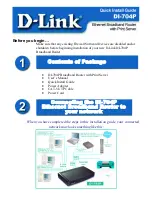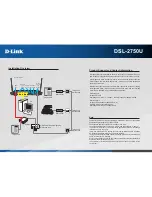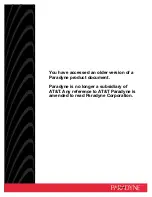
250
filter-policy
{
acl6-number
|
prefix-list
ipv6-prefix-name
}
export
[
protocol process-id
]
undo filter-policy
{
acl6-number
|
prefix-list
ipv6-prefix-name
}
export
[
protocol process-id
]
Default
No outbound routing information is filtered.
Views
BGP IPv4 unicast instance view, BGP-VPN IPv4 unicast instance view, BGP IPv6 unicast instance view,
BGP-VPN IPv6 unicast instance view
Predefined user roles
network-admin
Parameters
acl-number
: Specifies an ACL by its number in the range of 2000 to 3999 to match routes by destination.
acl6-number
: Specifies an ACL6 by its number in the range of 2000 to 3999 to match routes by
destination.
prefix-list
prefix-list-name
: Specifies an IPv4 prefix list by its name, a case-sensitive string of 1 to 63
characters, to match routes by destination.
prefix-list
ipv6-prefix-name
: Specifies an IPv6 prefix list by its name, a case-sensitive string of 1 to 63
characters, to match routes by destination.
protocol
: Filters routes redistributed from the routing protocol. In BGP IPv4 unicast instance
view/BGP-VPN IPv4 unicast instance view, it can be
direct
,
isis
,
ospf
,
rip
, or
static
. In BGP IPv6 unicast
instance view/BGP-VPN IPv6 unicast instance view, it can be
direct
,
isisv6
,
ospfv3
,
ripng
, or
static
.
process-id
: Specifies a routing protocol by its ID in the range of 1 to 65535. In BGP IPv4 unicast instance
view/BGP-VPN IPv4 unicast instance view, it is available only when the protocol is
isis
,
ospf
, or
rip
. In
BGP IPv6 unicast instance view/BGP-VPN IPv6 unicast instance view, it is available only when the
protocol is
isisv6
,
ospfv3
, or
ripng
.
Usage guidelines
If a protocol
is specified, this command filters only routes redistributed from the specified protocol. If no
protocol is specified, this command filters all redistributed routes, including routes redistributed from IGP
and injected by the
network
command.
If you use a basic ACL (with a number from 2000 to 2999) configured with the
rule
[
rule-id
] {
deny
|
permit
}
source
source-address
source-wildcard
command, the command matches routes whose
destination addresses match the
source-address source-wildcard
argument without matching the masks
of the destination addresses.
The following guidelines apply when you use an advanced ACL (with a number from 3000 to 3999) in
the command:
•
To deny/permit a route with the specified destination, use the
rule
[
rule-id
] {
deny
|
permit
}
ip
source
sour-addr sour-wildcard
command.
•
To deny/permit a route with the specified destination and mask, use the
rule
[
rule-id
] {
deny
|
permit
}
ip source
sour-addr sour-wildcard
destination
dest-addr dest-wildcard
command to
deny/permit a route with the specified destination and mask.
The
source
keyword specifies the destination address of a route and the
destination
keyword specifies the
subnet mask of the destination. The subnet mask must be contiguous. Otherwise, the configuration does
not take effect.
















































